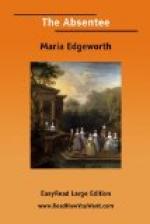The particulars we cannot stay to detail: this grateful man, however, took pleasure in sounding the praises of his benefactor, and in raising him in the opinion of the traveller.
’As you’ve time, and are curious about such things, sir, perhaps you’d walk up to the school that Mrs. Burke has for the poor children; and look at the market-house, and see how clean he takes a pride to keep the town; and any house in the town, from the priest to the parson’s, that you’d go into, will give you the same character as I do of Mr. Burke: from the brogue to the boot, all speak the same of him, and can say no other. God for ever bless and keep him over us!’
Upon making further inquiries, everything the innkeeper had said was confirmed by different inhabitants of the village. Lord Colambre conversed with the shopkeepers, with the cottagers; and, without making any alarming inquiries, he obtained all the information he wanted. He went to the village school—a pretty, cheerful house, with a neat garden and a play-green; met Mrs. Burke; introduced himself to her as a traveller. The school was shown to him: it was just what it ought to be—neither too much nor too little had been attempted; there was neither too much interference nor too little attention. Nothing for exhibition; care to teach well, without any vain attempt to teach in a wonderfully short time. All that experience proves to be useful, in both Dr. Bell’s and Mr. Lancaster’s modes of teaching, Mrs. Burke had adopted; leaving it to ‘graceless zealots’ to fight about the rest. That no attempts at proselytism had been made, and that no illiberal distinctions had been made in this school, Lord Colambre was convinced, in the best manner possible, by seeing the children of Protestants and Catholics sitting on the same benches, learning from the same books, and speaking to one another with the same cordial familiarity. Mrs. Burke was an unaffected, sensible woman, free from all party prejudices, and, without ostentation, desirous and capable of doing good. Lord Colambre was much pleased with her, and very glad that she invited him to dinner.
Mr. Burke did not come in till late; for he had been detained portioning out some meadows, which were of great consequence to the inhabitants of the town. He brought home to dine with him the clergyman and the priest of the parish, both of whom he had taken successful pains to accommodate with the land which suited their respective convenience. The good terms on which they seemed to be with each other, and with him, appeared to Lord Colambre to do honour to Mr. Burke. All the favourable accounts his lordship had received of this gentleman were confirmed by what he saw and heard. After the clergyman and priest had taken leave, upon Lord Colambre’s expressing some surprise, mixed with satisfaction, at seeing the harmony which subsisted between them, Mr. Burke assured him that this was the same in many parts of Ireland. He observed, that ’as




